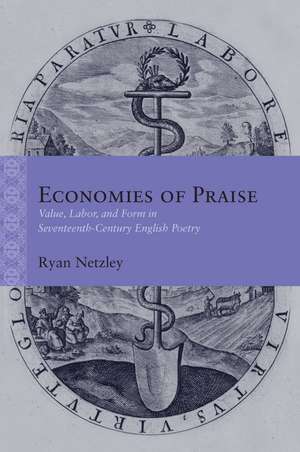Economies of Praise: Value, Labor, and Form in Seventeenth-Century English Poetry: Rethinking the Early Modern
Autor Ryan Netzleyen Limba Engleză Hardback – 15 mar 2024
Early modern poems of praise typically insist that they do not have a purpose or enact real labor beyond their effortless listing of laudable qualities. And yet the poets discussed in this study, including Ben Jonson, Andrew Marvell, Anne Bradstreet, Lucy Hutchinson, and John Milton, hint at an alternative aesthetic economy at work in their verse. Poetic praise, it turns out, might show us a social world outside the organizing principle of exchange.
In Economies of Praise: Value, Labor, and Form in Seventeenth‑Century English Poetry, Ryan Netzley explores how poems of praise imagine alternatives to market and gift economies and point instead to a self-contained aesthetic economy that works against a more expansive and productivist understanding of literary art. By depicting exchange as inconsequential, unproductive, and redundant rather than a necessary constituent of social order, these poems model for modern readers a world without the imperative to create, appraise, and repeatedly demonstrate one’s own value.
Preț: 504.13 lei
Nou
Puncte Express: 756
Preț estimativ în valută:
96.47€ • 100.15$ • 80.45£
96.47€ • 100.15$ • 80.45£
Carte indisponibilă temporar
Doresc să fiu notificat când acest titlu va fi disponibil:
Se trimite...
Preluare comenzi: 021 569.72.76
Specificații
ISBN-13: 9780810146709
ISBN-10: 0810146703
Pagini: 256
Dimensiuni: 152 x 229 x 20 mm
Greutate: 0.45 kg
Editura: Northwestern University Press
Colecția Northwestern University Press
Seria Rethinking the Early Modern
ISBN-10: 0810146703
Pagini: 256
Dimensiuni: 152 x 229 x 20 mm
Greutate: 0.45 kg
Editura: Northwestern University Press
Colecția Northwestern University Press
Seria Rethinking the Early Modern
Notă biografică
RYAN NETZLEY is a professor of English at Southern Illinois University, Carbondale. He is the author of Lyric Apocalypse: Milton, Marvell, and the Nature of Events and Reading, Desire, and the Eucharist in Early Modern Religious Poetry.
Cuprins
Acknowledgements
Introduction: “You’re Great”: Value, Time, and the Reader’s Work in Seventeenth-Century Poems of Praise
Chapter 1: The Value of Now: Jonson, Literary Presents, and the Surveying Reader
Chapter 2: Insignificant Numbers: Sequence, Size, and the Value of Counting in Herrick and Marvell
Chapter 3: More Mine, Then Thine: Praise, “Praise,” and the Repetition of Value in Devotional Poetry
Chapter 4: She’s Dead: Metaphorical Work and Exemplary Mourning in Marvell, Hutchinson, and Bradstreet
Chapter 5: Henceforth Thus Then: Explanation, Repetition, and Praise in Paradise Lost
Conclusion: Time’s Up: Learning from Praise
Notes
Bibliography
Introduction: “You’re Great”: Value, Time, and the Reader’s Work in Seventeenth-Century Poems of Praise
Chapter 1: The Value of Now: Jonson, Literary Presents, and the Surveying Reader
Chapter 2: Insignificant Numbers: Sequence, Size, and the Value of Counting in Herrick and Marvell
Chapter 3: More Mine, Then Thine: Praise, “Praise,” and the Repetition of Value in Devotional Poetry
Chapter 4: She’s Dead: Metaphorical Work and Exemplary Mourning in Marvell, Hutchinson, and Bradstreet
Chapter 5: Henceforth Thus Then: Explanation, Repetition, and Praise in Paradise Lost
Conclusion: Time’s Up: Learning from Praise
Notes
Bibliography
Recenzii
“This is a book for our times. Its scholarship is exemplary, its close readings compelling, and its range of critical and theoretical reference impressive throughout.” —Catherine Bates, University of Warwick
“Ryan Netzley has firmly established himself as one of the most interesting readers of early modern lyric poetry, and arguably the most provocative. Economies of Praise will further that reputation.” —James Kuzner, Brown University
“Ryan Netzley has firmly established himself as one of the most interesting readers of early modern lyric poetry, and arguably the most provocative. Economies of Praise will further that reputation.” —James Kuzner, Brown University
Descriere
Reevaluates early modern poems of praise as, paradoxically, challenging an artistic economy that values exchange and productivity














